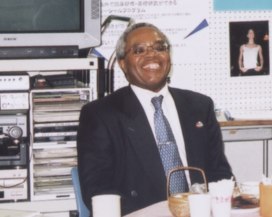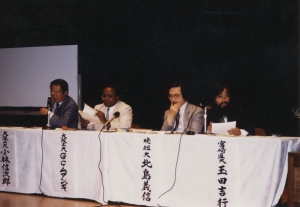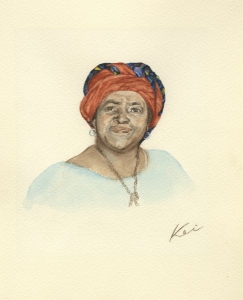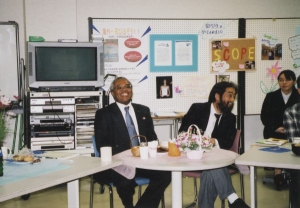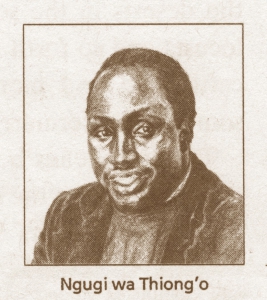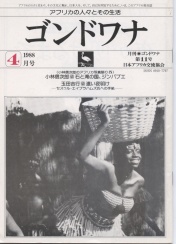概要
グギの言語選択と亡命後のケニアの状況を論じたグギの作家論、作品論です。英語で書いていたグギが母国語のギクユ語で書き始めた動機、ギクユ語で農民や労働者のために書いた劇『結婚?私の勝手よ!』(Ngaahika Ndeenda, 1978)の上演から逮捕・拘禁、亡命に至るまでの経緯を、亡命後に出された新聞や雑誌のインタビュー記事を基に検証した後、『結婚?私の勝手よ!』の作品と、経済不況やエイズ禍に見舞われている亡命後の二十年の分析を行ないました。
本文(写真作業中)
Ngugi wa Thiong’o, the writer in politics:
his language choice and legacy
- “Shipwrecked”
The aim of this essay is to provide an estimation of Ngugi wa Thiong’o and his writings by tracing how he made a language choice of his writing, and how he has been forced to live in exile and still struggles against injustice from outside his country. The following analyses are to point out the harsh realities that contemporary African writers in politics are to confront, and at the same time, to pose us a grave question that part of the prosperity in the developed world is based on the sacrifice of those kinds of harsh realities that Ngugi is now confronting.
Twenty years have passed since Ngugi wa Thiong’o visited London on June 8, 1982 and never returned to his home. He is staying in the United States in exile and his homecoming has never been realized. As he refers to his own situation as being “shipwrecked,” recalling James Joyce’s mariners, renegades, and castaways, he is now living “the reality of the modern writer in Africa.”1
Why was he forced to be “shipwrecked”? The reason is quite simple; he became a real threat to the Kenyan government.
He was educated at Makerere University, Uganda and at Leeds University, in the United Kingdom, in a Western style as many African leaders were. “At Makerere University the course was based on the syllabus for English studies at the University of London,”2 so in due course he began to make his writings in English under the name of James Ngugi. His works were highly evaluated; Weep Not, Child won the first prize for Anglophone novels at the first World Festival of Negro Arts in Dakar in 1966; he was awarded the Lotus Prize in Literature at the 5th Afro-Asian Writers Conference in Alma Ata, Khazakhstan in 1973. That same year he attended the International Emergency Conference on Korea in Tokyo and delivered a speech, appealing for the release of the Korean poet Kim Chi Ha, then imprisoned in South Korea.
In 1967 he became Special Lecturer in English of University College, Nairobi, the first African member of the department. At many international conferences he delivered vigorous plenary speeches and presented extensive papers. He was also invited by many universities to lecture. All his activities, however, were in the context of English literature by an African writer, not in the context of African Literature. As long as he was perceived in this context, he was not a real threat to the regime; on the contrary he was to play a role of the spokesman who showed the world that the newly independent Kenya was a “democratic” country with freedom of speech guaranteed.
It was not until he began to walk together with peasants and workers by making his writings in his mother tongue, Gikuyu, after changing name to Ngugi wa Thiong’o that he became a symbol of threat to the system.
In Kenya, like in other African countries, the basis of the exploiting system is peasants and workers. When Europeans began to colonize African countries, they robbed Africans of their land and posed them various taxes, so Africans were forced to become landless peasants and workers. Some were forced to pick up tea as wage workers in white man’s farms and others to serve as domestic workers for white families. In that system there were no problems for the regime as long as Ngugi was not truly on the side of the peasants and workers, however hard he made his literary activities even in an international context.
The situation became totally different when Ngugi began to stand on the side of peasants and workers.
- “To choose an audience is to choose a class”
Under the colonial system the creation of a middle class was intentionally prevented by Europeans and filled the gap with imported foreigners. But companies and plantations needed foremen who served as mediators and could speak the language of the employers, which led to the development of a new type of administrative African middle class. They were given the privilege of going to school and learned much of European culture. They began to read criticism against colonialism. Some of them reacted against the cultural oppression in the colonies. Some of them were against social discrimination as a group, but they were tempted to imitate the Europeans’ privileged way of life. From the beginning Ngugi was involved in that kind of contradiction.
So, it is natural that while he was active as a creative writer and teacher at Nairobi University, he repeatedly asked himself: “For whom do I write?” He keenly felt the contradiction of language choice. He recalls:
I was a student at Leeds University in the mid-Sixties when I first strongly felt a sense of despair at that contradiction in my situation as a writer. I had just published A Grain of Wheat, a novel that dealt with the Kenyan peoples’ struggle for independence. But the very people about whom I was writing were never going to read the novel or have it read for them. I had carefully sealed their lives in a linguistic case. Thus whether I was based in Kenya or outside, my opting for English had already marked me as a writer in exile. Perhaps Andrew Gurr had been right after all. The African writer is already set aside from people by his education and language choice.
The situation of the writer in 20th-century Africa mirrors that of the larger society. For if the writer has been in a state of exile – whether it is physical or spiritual – the people themselves have been in exile in relationship to their economic and political landscape.3
When he was involved in the community activities by the peasants and workers, it was natural that he made a major shift in his life. At that time there was a choice for him as to whether he should stand on the side of the regime or on the side of peasants and workers. He explains:
In 1976 the peasants and workers of Kamiriithu village, which is about 30km from Nairobi, came together to form what later came to be called the Kamiriithu Community, Education, and Culture Centre. These people wanted a theatre. How could one then write or script a play without using their own language? I must say that this was a major shift in my life, and part of my decision, in fact, to write in the Gikuyu language had its origins in my experience working with the people of Kamiriithu.4
He chaired the cultural committee of the Centre, which commenced adult literacy classes. Village-based theatre groups were established and tried to create their own performances but found it difficult to find a theatre to perform in. Even after independence, in every phase of society the cultural forces representing foreign interests were virtually dominant. Ngugi points out:
Now our visitor might visit schools. The English language dominates a Kenyan child’s life from primary school to university and after….a Kenyan child grows up admiring the culture carried by these foreign languages, in effect western European ruling class cultures and looks down on the culture carried by the language of his particular nationality….
But it is in the theatre that this domination by foreign cultural interests is most nakedly clear. Nairobi has recently seen a mushrooming of neo-colonial foreign cultural institutions like the French Cultural Centre, the German Goethe Institute, the Japanese Cultural Institute, and of course the American Information Services. Some of these institutes promote theatre and theatre-related events and discussions. But naturally they are basically interested in selling a positive image of their neo-colonial profit-hunting adventurism in Asia, Africa and Latin America….
What really annoys most patriotic Kenyans about the theatre scene in their own country is not so much the above foreign presences but the fact that the Kenya government-owned premises, The Kenya Cultural Centre and The Kenya National Theatre, should themselves be controlled by foreigners offering foreign theatre to Kenyans. A foreign imperialist cultural mission, i.e. The British Council, occupies virtually all the offices at The Kenya Cultural Centre. The governing council of the same Centre is chaired by a British national and The British Council is in addition represented on the council. The Kenya National Theatre which is run by the governing council is completely dominated by foreign-based theatre groups like The City Players and Theatre Ltd. What these groups offer has nothing to do with Kenyan life except when maybe they offer racist shows like The King and I or Robinson Crusoe….5
Given these circumstances the group at the Center began to perform their own play by themselves in 1977. They asked Ngugi and his colleague Ngugi wa Mirii to script a play in Gikuyu. It was a turning point and a major shift in his life; he was not able to avoid his language choice. He sums up his own choice:
…If you write in a foreign language, you are (whether you like it or not) assuming a foreign-language readership. In other words, if you are writing in English you must be assuming an English-speaking readership – in most African countries this can only mean a minority ruling class, a ruling class which is often the object of your criticism as a writer. If I write in the Gikuyu language (or in any African language, for that matter); I am assuming an African readership and so, in fact, am assuming a peasant and worker audience. That is why it is correct to say that to choose an audience is to choose a class.6
Ngugi chose a peasant and worker audience and, along with Ngugi wa Mirii, wrote for them a script of Ngaahika Ndeenda which later came to be known as I will marry when I want.
He became reassured that he should play the role of a writer:
What is important is not only the writer’s honesty and faithfulness in capturing and reflecting the struggles around him, but also his attitude to those big social and political issues. It is not simply a matter of a writer’s heroic stand as a social individual – though this is crucial and significant – but the attitudes and the world view embodied in his work and with which he is persuading us to identify vis-a-vis the historical drama his community is undergoing. What we are talking about is whether or not a writer’s imaginative leap to grasp reality is aimed at helping in the community’s struggle for a certain quality of life free from all parasitic exploitative relations – the relevance of literature in our daily struggle for the right and security to bread, shelter, clothes and song, the right of a people to the products of their own sweat. The extent to which the writer can and will help in not only explaining the world but in changing it will depend on his appreciation of the classes and values that are struggling for a new order, a new society, a more human future, and which classes and values are hindering the birth of the new and the hopeful. And of course it depends on which side he is in these class struggles of his times.7
Through the theatrical activities with peasants and workers, he made clear his standpoint as a writer. He began to stand on the side of the class of peasants and workers.
Those peasants and workers were enthusiastic; they designed and built an open-air stage in the centre of the village. The actors were all peasants and workers. They completely broke with the hitherto accepted theatrical traditions; the initial reading and discussion of the script was done in the open; the selection of actors was done in the open with the village audience helping in the selection; all the rehearsals for four months were done in the open with an ever increasing crowd of commentators and directors; the dress rehearsal was done to an audience of over one thousand peasants and workers.
“When the show finally opened to a fee-paying audience, the group performed to thousands of peasants and workers who often would hire buses or trek on foot in order to come and see the play. For the first time, the rural people could see themselves and their lives and their history portrayed in a positive manner. For the first time in their post-independence history a section of the peasantry had broken out of the cruel choice that was hitherto their lot: the bar or the church. And not the least, they smashed the racialist view of peasants as uncultured recipients of cultures from beneficient foreigners.”8
With the help of writers peasants and workers began to become conscious of their position in the society and to understand the exploiting system around them, which might have been a real threat to the regime.
- Ngaahika Ndeenda
How is his imaginative leap to grasp reality “aimed at helping in the community’s struggle for a certain quality of life free from all parasitic exploitative relations”? How could “thousands of peasants and workers see themselves and their lives and their history portrayed in a positive manner”?
Ngaahika Ndeenda is a three-act play about Kiguunda, a farm labourer and his relatives and his neighbours. He is cheated by Ahabkioi (Kioi), a wealthy farmer and businessman and robbed of his land. In the process he realizes how farm labourers are exploited by wealthy Kenyans who collaborate with foreign businessmen, and at the same time how important their unity is to struggle “for the right and security to bread, shelter, clothes and song, the right of a people to the products of their own sweat.”
In the play Kiguunda complains of their hardships of life:
…I drive a machine all the day,
You pick tea-leaves all the day,
Our wives cultivate the fields all the day
And someone says you don’t work hard?
The fact is
That the wealth of our land
Has been grabbed by a tiny group
Of the Kiois and the Ndugires
In partnership with foreigners!…9
Kiguunda is one of the poor wage workers. One day he receives Kioi’s visit. Kioi has become rich as he was one of the homeguards who were employed as local agents enforcing Emergency rules during the Independence War. His aim was to acquire Kiguunda’s small pieces of land. A foreign businessman asks Kioi to drive the poor labourers to sell their strips of land for a planned insecticide factory. He always collaborates with foreign businessmen.
Kiguunda is cornered and ends up with losing his land. He tries to kill Kioi with a knife for revenge, but in vain.
One of the neigbours tries to comfort Kiguunda during his troubles.
Whatever the weight of our problems,
Let’s not fight among ourselves.
Let’s not turn violence within us against us,
Destroying our homes
While our enemies snore in piece.…10
At the end of the play they sing together in unison;
[Sings]
Two hands can carry a beehive,
One man’s ability is not enough,
One finger cannot kill a louse,
Many hands make work light.
Why did Gikuyu say those things?
Development will come from our unity.
Unity is our strength and wealth.
A day will surely come when
If a bean falls to the ground
It’ll be split equally among us,
For –11
This historical success of those peasants and workers eventually leads to Ngugi’s political detention. At the end of 1977 he was arrested and detained. After about a whole year’s detention he was released, but denied his position of University of Nairobi. In 1979 he was arrested again, this time, with Ngugi wa Mirii, the co-author of Ngaahika Ndeenda.
- Kenyatta detained Ngugi
In 1977 Ngugi was detained by the president Jomo Kenyatta, who once fought against colonialism for independence together with peasants and workers. In 1979 he was detained by Daniel arap Moi who succeeded Kenyatta and has ruled unchallenged for more than twenty three years.
It was ironic indeed that Jomo Kenyatta, the hero of the Independence War detained Ngugi. Kenyatta, once one of the oppressed, who fought against the oppressor for independence, became the oppressor. Ngugi hints to us how Kenyatta made the shift after independence;
But KANU (the Kenya African National Union) was a mass movement containing within it different class strata and tendencies: peasant, proletarian, and petty-bourgeois. Leadership was in the hands of the petty-bourgeoisie, itself split into three sections representing three tendencies: there was the upper petty-bourgeoisie that saw the future in terms of a compradorial alliance with imperialism; there was the middle petty-bourgeoisie which saw the future in terms of national capitalism; and there was the lower petty-bourgeoisie which saw the future in terms of some kind of socialism. The upper petty-bourgeoisie can be branded as comprador; and the middle and lower petty-bourgeoisie can be branded as nationalistic. The internal struggle for the ideological dominance and leadership of KANU from 1961 to 1966 was mainly between the faction representing comprador bourgeois interests, and the faction representing national patriotic interests. The faction representing the political line of comprador bourgeoisie was the one enormously strengthened when KADU (the Kenya African Democratic Union) joined KANU. This faction, led by Kenyatta, Gichuru and Mboya, also controlled the entire coercive state machinery inherited intact from colonial times. The patriotic faction was backed by the masses but it did not control the central organs of the party or the state and it was the one considerably weakened by KADU’s entry. But the internal struggles continued with unabated fury.
The struggles were primarily over what economic direction Kenya should take. The comprador bourgeoisie which had been growing in the womb of the colonial regime desired to protect and enhance its cosy alliance with foreign economic interests….
But by 1966, the comprador bourgeois line, led by Kenyatta, Mboya and others, had triumphed. This faction, using the inherited colonial state machinery, ousted the patriotic elements from the party leadership, silencing those who remained and hounding others to death.12
Kenyatta, as the president of the state and the representative of the comprador bourgeoisie class, had no other choice but to oust Ngugi, one of the patriotic elements, for he was a real threat to the whole system. Through cultural activities Ngugi helped peasants and workers, the very basis of the exploitative system, to be conscious of who they are and what the system is.
And, he was “shipwrecked.”
- “The continent left to die”
In the past twenty years while Ngugi was away from his country, the comprador bourgeoisie class and some industrialized countries have enhanced their alliances by strengthening their economic ties. Those industrialized countries have prospered by making the best use of ODA (Official Development Assistance), an important instrument of neo-colonial strategies, in addition to investments and trade. Japan is one of the leading trading partners being the No. 1 ODA donor to Kenya.13 The comprador bourgeoisie class, the most influential force in those countries, has salted away a personal fortune by using the state machinery. President Moi is believed to own a whole street in Hawaii, some buildings in New York City, and to keep a tremendous amount of money in a Swiss bank, as Mobutu in Zaire once did. The debts of the country have accumulated year by year. Corruption has eaten deep into the fabric of the whole society. The gap between the rich and the poor has deepened further. The land has deteriorated even more. And now the AIDS epidemic has attacked the country relentlessly. This sexally transmitted disease is fatal in poor countries, especially in a culture like Kenya’s where prostitution and male promiscuity are widely accepted because of the polygamy system.
Once a person is infected with HIV, there is no cure at present, even though therapy can prolong the lives of the patients. It follows that without drugs many infected victims will die soon or later in countries like Kenya. The drastic reduction of population in developing countries never fails to threaten the present structure of the neo-colonial system in the industrialized countries to its foundation, for the basis of exploitation is upon peasants and workers in developing countries.
Researchers have developed a lot of drugs and now multi-drug therapy, through a combination of reverse transcriptase inhibitors and protease inhibitors, is transforming and prolonging the lives of many AIDS patients. But the price of the drugs is tremendous even in the industrialized countries. In developing countries like Kenya, drug therapies are completely out of reach financially.
“Africa: the continent left to die,” the title of a newspaper article, is very shocking, but it symbolizes the scourge of this AIDS epidemic:
Twenty years is a long time. The fact that Ngugi’s homecoming has not been realized shows that the comprador bourgeoisie class has prospered by using the state machinery and by enhancing alliances with foreign economic interests. But the land has deteriorated even more. The gap between the rich and the poor has deepened. The country is in crisis with corruption and accumulated debts. And now the AIDS threat has been added. “Africa: the continent left to die,” the title of a newspaper article, is very shocking, but it symbolizes the plight of this AIDS situation:our time;
With the “AIDS time bomb" widely perceived as having been brought under control in the industrialised world, new figures show that despite strenuous efforts in many African countries, the Human Immunodeficiency Virus (HIV) is beginning to exact its deadly toll on the continent. At least 30 million Africans are expected to die from AIDS in the next 20 years: it will kill more people than war or famine, it will undermine young democracies and put millions of orphans on the streets.
Among Africans, whose nutritional intake is poor, Acquired Immune Deficiency Syndrome (AIDS) kills quickly. Among the uneducated and superstitious, where the status of women is low, AIDS spreads unhindered and sufferers are thrown out by their families or have their homes burnt down. Only a tiny elite can afford drugs such as AZT, 3TC and protease inhibitors, which can make AIDS a chronic disease rather than a death sentence.14
Kenya is in a deep crisis that we have never seen before. Ngugi’s mother country is now “left to die.”
Kenya, Ngugi wa Thiong’o’s mother country, is now “left to die.”
(Miyazaki Medical College)
<Notes>
1 Ngugi wa Thiong’o, “From the corridors of silence,” The Weekend Guardian (October 21-22, 1989), p. 2.
2 Ngugi, “Ngugi on Ngugi,” in Ngugi wa Thiong’o: The Making of a Rebel by Carol Sicherman (Hans Zell Publishers, 1990), p. 21.
3 Ngugi, “From the corridors of silence,” p. 3.
4 Ngugi, “Interview with Ngugi wa Thiong’o,” Marxism Today (September, 1982), p. 35.
5 Ngugi, Writers in Politics (London: Heinemann, 1981), pp. 43-44.
6 Ngugi, “Interview with Ngugi wa Thiong’o,” p. 35.
7 Ngugi, Writers in Politics, pp. 74-75.
8 Ngugi, Writers in Politics, p. 47.
9 Ngugi, Ngaahika Ndeenda; I Will Marry When I Want (Harare: Zimbabwe Publishing House, 1986), pp. 61-62.
10 Ngugi, Ngaahika Ndeenda; I Will Marry When I Want, p. 110.
11 I Will Marry When I Want, pp. 114-115.
12 Ngugi, Detained: A Writer’s Prison Diary (London: Heinemann, 1981), pp. 52-54.
13 The Homepage of the Ministry of Foreign Affairs of Japan:http://www.mofa.go.jp/mofaj/gaiko/oda99/ge/g5-12.htm
14 Alex Duval Smith, “Africa: the continent left to die,” The Independent included in The Daily Yomiuri (September 12, 1999), p. 14.
執筆年
2003年
収録・公開
「言語表現研究」19号 12-21 ペイジ
ダウンロード
Ngugi wa Thiong’o, the writer in politics: his language choice and legacy
